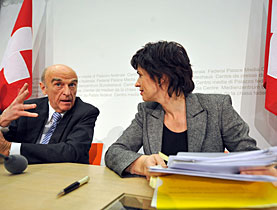Swiss economy shrinks as exports slump

Swiss gross domestic product (GDP) for the first quarter of 2009 has fallen by 0.8 per cent on the previous three months, its worst quarterly performance since 1992.
Negative growth was registered in particular in exports, according to the State Secretariat for Economic Affairs (Seco) on Tuesday.
The year on year drop was 2.4 per cent, the sharpest contraction since 1976.
“It’s a bad number – Switzerland is in a bad shape – but in other countries the effect is even worse,” Seco’s chief economist, Aymo Brunetti, told swissinfo.ch.
He admitted it was “more or less in line with what we expected”.
“We all know that at least for world markets it’s the worst recession since the Second World War, so it’s not very surprising that Switzerland is affected,” he said.
This was confirmed by UBS analyst Reto Hünerwadel. “The 2.4 per cent drop in GDP is not very upbeat, confirming the Swiss economy is still feeling the heat of the global economic slowdown. But it is still comparably solid compared with other European economies,” he said.
German GDP for example has slumped 3.8 per cent on the quarter in the first three months of 2009.
Seco reported that exports dropped by 5.4 per cent on the quarter, coming on top of an 8.7 per cent fall in the final quarter of 2008.
Exports of goods – down 6.6 per cent – were again more seriously affected than exports of services, down 2.3 per cent. In contrast to exports, imports of goods and services remained at the same level as the previous quarter.
“Stabilising effect”
“Of course we’ve been very clearly affected on the exports side, but at least on the domestic markets we had some very good years, so we think the domestic market is quite resilient,” Brunetti said.
He highlighted some factors he believed played a role in Switzerland’s less-worse-than-others performance.
“We don’t have the kind of problem in the housing market that many other countries have. We had quite high wage settlements at the end of last year and these might give some stabilising effect on the consumption side.”
Nevertheless, Switzerland slipped into recession last summer and the Swiss National Bank (SNB) forecasts an economic contraction of up to three per cent in 2009, which would be the worst decline in over 30 years, after an overall growth of 1.6 per cent in 2008.
A “noteworthy” rise in spending, said Seco, was observed only in the fields of healthcare and communications.
In contrast, spending declined in the sectors for clothing, furniture, transport and financial and insurance services. Construction continued its downward trend, dropping one per cent.
Uncertainty
As for the future, Brunetti hopes “that the policies that have been undertaken until now will be sufficient, but if the recession continues, there is a discussion in Switzerland on whether there is a need for another package of measures”.
The economic stimulus measures would follow two earlier rounds of funding in the past year totalling SFr1 billion.
“A lot has been done on the monetary policy side, but intentionally we have a step-by-step approach because the uncertainty is so big – on both the favourable and unfavourable side,” Brunetti said.
“It will be very interesting to see what happens in the next quarter, because in many countries the first quarter was so bad that the evaluation was that this must be a kind of turning point,” he added.
“But I would be very careful of making forecasts about the turning point – it all depends on the recovery of world markets. This is the most important thing for the Swiss business cycle right now.”
Thomas Stephens, swissinfo.ch
Economists are predicting tougher times for this year and next:
State Secretariat for Economic Affairs (Seco): –2.2 % (March 2009)
Swiss National Bank: –2.5 to –3% (March 2009)
UBS Wealth Management: –8% (March 2009)
UBS Investment Bank: –2.4% (April 2009)
Credit Suisse: –2.0% (March 2009)
KOF: –2.4% (March 2009)
BAK Basel Economics: –2.1% (March 2009)
Créa: –3.2% (May 2009)
Business Economists’ Consensus: –1.4% (March 2009)
IMF: –3.0% (April 2009)
OECD: –0.2 (November 2008)

In compliance with the JTI standards
More: SWI swissinfo.ch certified by the Journalism Trust Initiative




You can find an overview of ongoing debates with our journalists here. Please join us!
If you want to start a conversation about a topic raised in this article or want to report factual errors, email us at english@swissinfo.ch.